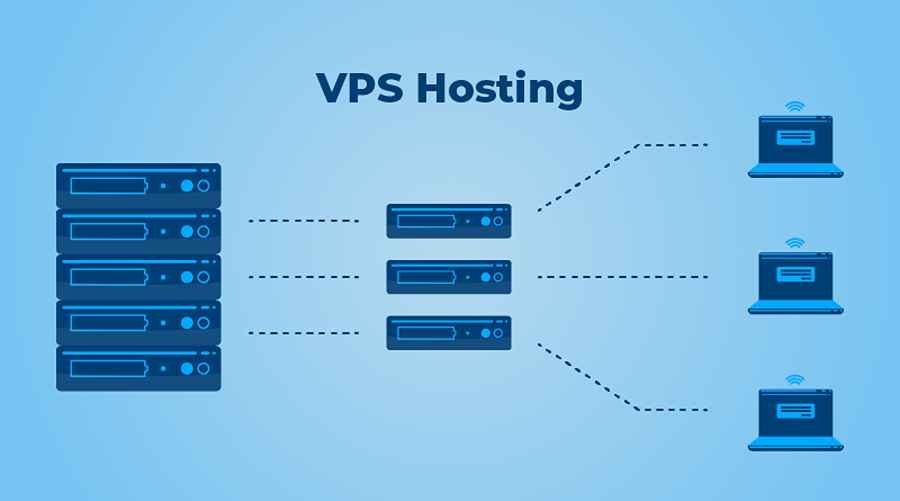There are diverse types of web hosting services offered by popular providers.
Each is tailored to a specific requirement (s).
For new websites, shared hosting provides everything required to be up and running quickly.
As your company expands, you will need to upgrade to a more expensive type with more features to offer.
1. Shared Hosting

Summary
- The commonest and cheapest website hosting available
- Suitable for new websites and small businesses.
- Many user data are hosted on and share a single hosting server
- Limited server resources
- An increase in users and websites on your server affects the load speed of your website.
- The hosting provider handles server-side website maintenance and security patches.
- Users have no control over the server
- Recommended examples: Bluehost, Hostgator, Hostinger, and SiteGround.
This is the most common and basic hosting plan available from hosting companies, and it is suited for the majority of Internet business owners.
The ideal choice for new websites and blogs, small e-commerce sites, freelancers, small enterprises, and websites with minimal traffic, this is the least expensive.
This is the smartest choice for smaller or startup companies.
Here, a single server’s hosting resources, such as storage, bandwidth, computing power, etc., are shared by many users/customers of the hosting provider.
Because the provider handles all of the effort associated with server maintenance and regular security checks, shared hosting is widely available, less expensive, and simpler to set up.
The biggest drawback is that you will receive a space that is relatively unpolished, typically on a generic server with few resources.
Furthermore, you have no control over the server and cannot change its resources.
This means that shared server space can and will only get you so far with your website.
As your site grows in popularity, it may require more resources than your shared hosting plan can provide.
The more sites you have on your shared server, the slower and less efficient your own website will be.
In many cases, shared hosting is still the best option; however, if this is something more important, such as a web store or a business site, a slow or unreliable website will drive visitors away, and it is well worth upgrading to something more powerful.
2. Virtual private server (VPS) Hosting

Summary
- Similar to but a bit pricier than shared hosting
- Suitable for fast-growing websites and medium-sized businesses.
- Each user has their own portion of server resources, unaffected by other users on the server.
- Users have control over the allocated server
- Easy to quickly and immediately access more server resources
- The user handles server website maintenance and security patches.
- Recommended example: Liquid Web.
Virtual private server (VPS) hosting is an ingenious technique that partitions a single physical server into several server environments.
Logging into a VPS provides you access to what appears to be the entire server, which is significantly more sophisticated than what is available in shared hosting because it gives users far more control over server resources.
In terms of speed, uptime, and the storage of several websites on the same server, virtual private server (VPS) hosting is identical to shared hosting.
You will be given your own partition on a server, complete with protected and reserved memory, network bandwidth, storage, and CPU computing capability.
Unlike shared hosting, there is no risk of your website’s or data’s performance being harmed by unexpected demands.
These will not be shared with other customers, so your site should have faster and more consistent speeds than with shared hosting.
You will pay slightly more than with shared hosting.
When your website traffic grows and you need more resources, you can typically add them to your plan with a single click.
You will also typically be granted complete root access to the server, as well as a lot more freedom to adjust some performance-related variables on the server.
Because you may expand your resources based on your demands, VPS hosting is ideal for websites that grow quickly.
VPS hosting can also help medium-sized businesses and/or websites run relatively complex web applications.
VPS hosting essentially includes all of the advantages of a dedicated server at the cost of a shared server.
3. Dedicated Hosting

Summary
- Involves securing a whole server and its resources
- Suitable for big enterprise websites and established large businesses.
- Users have full control over the allocated server
- Users can configure their server components as they please
- Easy to quickly and immediately access more server resources
- Better security as server resources are not shared.
- Users handle server maintenance and hence require technical expertise
- This type is a lot more expensive than shared and VPS hosting.
- Recommended example: Liquid Web.
This type entails securing a hosting server all to yourself rather than sharing website files with other websites on a single server.
The resources of the entire server are exclusively yours to use, making it ideal for large and enterprise websites.
Dedicated hosting also gives you access to your own server and complete server control.
You will have access to all of the server’s memory and processing capabilities, assuring consistently excellent performance.
You can typically select your CPU, storage, operating system, bandwidth allowance, and other features.
This sort of hosting enables websites to handle massive levels of traffic.
If you anticipate a big increase in website traffic, service outages, and slow connection speeds that could be disastrous to your organization; the cost of choosing a dedicated server would be justified.
A dedicated server will also beef up security.
Managing a dedicated server however requires more effort, managing the server is up to you unless you pay the provider to manage it for you.
On the downside, dedicated servers are typically expensive, take pretty considerable knowledge to set up, and can be difficult to scale because they typically operate with a preset amount of physical memory and compute capability.
Major enterprises and knowledgeable users that run highly trafficked websites, CPU-intensive web applications, or sophisticated databases often choose dedicated hosting.
4. Managed WordPress Hosting

Summary
- Involves hosting designed specifically for WordPress websites
- Suitable for all kinds of WordPress websites, especially established large websites.
- Users have full control over the allocated server
- Server features configured for faster speed and
- Better security as the server is designed for WordPress websites
- The provider handles all or the majority of website maintenance
- Limited to only WordPress customization options
- This type is a lot more expensive than shared and VPS hosting.
- Recommended example: WPEngine.
Managed WordPress hosting is a relatively new concept.
Given the popularity of WordPress as a content management system, many web hosting companies offer WordPress-specific hosting, which makes it easier to set up a WordPress site and frequently comes with features to increase performance and keep the site functioning more effectively.
Its goal is to make managing WordPress websites easier.
It also has highly optimized server configuration options like built-in caching and promises indefinite scalability.
If you purchase a plan, WordPress is normally pre-installed, so you will not have to install it yourself.
Some include WordPress themes, which allow you to create beautiful websites even if you lack design expertise.
When you purchase a managed WordPress hosting plan, the provider will offer some or all of the following system maintenance tasks: testing and upgrading WordPress plugins, automatic backups, applying operating system patches, better security, detecting and troubleshooting server faults, and so on.
If problems do arise with your website, your hosting company will handle them quickly.
This is suitable for businesses that have WordPress websites, particularly large-scale websites with thousands of visitors every month that require website management assistance.
If your WordPress requirements are basic, you may not require a customized WordPress hosting plan.
Most shared hosting plans include simple WordPress installation as well as a variety of other useful features at a much cheaper price.
5. Cloud Hosting

Summary
- A variant of VPS hosting that hosts website files on multiple servers
- Suitable for all kinds of WordPress websites.
- Website features can be accessed on demand and handle traffic surges effortlessly
- Offers better security as providers utilize industry-standard security for all hosted data
- The user handles all or the majority of website maintenance
- No limit whatsoever in customization and maintenance features
- This type is a lot more expensive than shared and VPS hosting.
- Pricing models are a lot more different, as some offer payment for services used only.
This is the most dependable type of hosting available, as it derives its strength from the valuable resources of numerous web servers, allowing them to collaborate, pool their resources, and run applications for your website.
Your site files are not stored on a single server’s disc space, as with other types of hosting hence, you will never experience downtimes.
Cloud hosting makes use of servers that take up the architecture of virtual private servers (VPS) in that while using storage website files on multiple servers, it is as though each user is allocated a definite portion of all the servers which may be dynamically altered in terms of memory and computing power.
It allows providers to be more flexible when assigning resources to each user on the system, thereby offering the best performance and connection speeds.
It is more expensive than shared hosting, but it will reduce any connection or speed concerns because it can easily withstand traffic surges.
Scalability, backups, and disaster recovery are also available with cloud hosting.
Conclusion

Understanding website hosting and choosing the appropriate option is critical to your website’s success.
With so many alternatives available, picking the best WordPress web hosting service/provider for a new website might be a bit confusing when you are just starting out.
For beginners, shared hosting meets most, if not all, of their website requirements.
Did you enjoy this post?
If so, please share it with your friends and followers on social media! It's a great way to help others learn about WordPress and to support our blog. You can use the share buttons below...
Elevate Your Brand with Professional Website Design
Discover how we can transform your online presence with professional website design services. We specialise in creating modern, user-friendly websites tailored for the medical, legal, university, and Christian sectors. If you're ready to elevate your brand and connect with your audience more effectively, contact us today to get started!
Tutorials on YouTube
And if you’re looking for more in-depth WordPress tutorials,be sure to subscribe to our YouTube channel! We have a wide variety of videos on WordPress.
